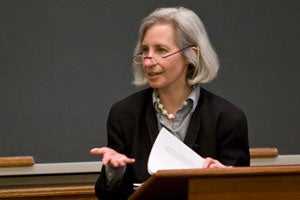In an address to the Harvard Law School community, Dean Martha Minow offered a survey of “The Past, Present, and Future of Legal Education: HLS and Beyond.”
Minow called the present “a time of innovation and a time of renewal” in legal education. She described the development of the study of law internationally in recent years, and cited the creation of new law schools in India and China and a revamped legal study program at McGill University in Canada as evidence of increasing interest in the globalization of legal education.
Identifying the multiple goals of law schools, Minow said, “We want pure academic inquiry. We also want to engage critique of law as it operates in society, and we also want to assist a profession that is itself caught between doing well and doing good—serving the haves and the have-nots.”
Click here to watch the webcast.
Minow identified three historical stages that legal education in the United States has gone through—a period prior to the Industrial Revolution in which lawyers were primarily trained through apprenticeship, a period that began in the 19th century in which Harvard led the charge to create a systematized, university-based approach to legal education dominated by the case method, and the period from 1935 through 2003 in which law schools added many electives but kept the common law at the core of the curriculum and the case method.
Minow went on to talk about legal education today, describing curricular reforms that HLS began exploring in 2003, culminating in the school’s revamped curriculum in 2007, which includes new required courses for first-year students in international law, legislation and regulation, and starting this year after two years of pilot versions, the first year Problem Solving Workshop. She also noted that the recent financial crisis has accentuated the need for “lawyers who have long-term and systemic thinking capacity about risk, regulation, and institutional design.”
She concluded with a discussion of her views on where legal education is headed in the near future. She predicted that lawyers will have opportunities to play new and important roles in response to dramatic economics, technological, and social changes presented by new communications technologies, new biological and bio-technology research, and globalization. They will deal with: integrating economies; legal and professional services; biological and computer viruses, cultural trends fostered through world-wide networks of exchange; resource scarcity and global climate change; and mass migrations of people, due to economic, political, and environmental changes. Law students and lawyers will be aided by new knowledge about the way adults learn; they will be challenged by new financial pressures on graduates and on institutions. The “value proposition” confronting all of higher education in the United States is itself under pressure, Minow said, especially given global competition and new digital technologies. Law schools have opportunities to emphasize a comparative advantage in equipping leaders to tackle large and complex problems.
Minow said that in reviewing their business models, law schools should consider how their educational mission itself could be even more closely connected to meeting society’s most pressing challenges—such as corporate governance, the governance of the Internet, access to legal services, energy and environmental regulation, and strengthening the rule of law in fragile societies.
Members of the HLS faculty are at work on these problems, she said but the school should explore new ways in which law students can more fully participate in advanced work in these areas with faculty and in clinics, to contribute to solutions.
